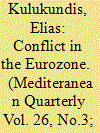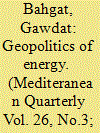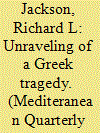|
|
|
Sort Order |
|
|
|
Items / Page
|
|
|
|
|
|
|
| Srl | Item |
| 1 |
ID:
141803


|
|
|
|
|
| Summary/Abstract |
The crisis of the eurozone has narrowed to a conflict between Greece and Germany. At times it has appeared to be a family quarrel with all the animosity that a family can generate. The two are like an elderly father and an adolescent son unable to talk to each other. The son questions everything and wants to engage in dialogue, but his provocative watiy of framing questions drives the father to exasperation. The father answers questions with maxims and mantras, and his refusal to engage in dialogue impels the son to further provocation.
|
|
|
|
|
|
|
|
|
|
|
|
|
|
|
|
| 2 |
ID:
141806


|
|
|
|
|
| Summary/Abstract |
The sharp drop in oil prices since June 2014 has drastically altered the global energy landscape. This essay examines the growing energy cooperation between Iran and Turkey and the strategic and economic implications for Europe. It argues that the emerging energy partnership between Tehran and Ankara can contribute to Europe’s energy security.
|
|
|
|
|
|
|
|
|
|
|
|
|
|
|
|
| 3 |
ID:
141807


|
|
|
|
|
| Summary/Abstract |
This essay provides programmatic and administrative recommendations for the effective building of civil, governmental, and private capabilities to help implement human development driven by local communities in Morocco in light of the Arab Spring. The essay relates a human development model rooted in decentralization to situations with powerful regional implications: in Iraq, Palestine, and the Western (Moroccan) Sahara. The engine for sustainable human development depends on local communities and neighborhoods identifying, planning, and implementing the socioeconomic and environmental projects they most need. Morocco has created a number of essential national frameworks for promoting such development, but their implementation is inadequate due to a lack of financing, of effective training, and of the application of methods that promote communal dialogue and democratic planning. Human development is examined in the context of free trade, with particular attention paid to rural areas, where most poverty is concentrated.
|
|
|
|
|
|
|
|
|
|
|
|
|
|
|
|
| 4 |
ID:
141805


|
|
|
|
|
| Summary/Abstract |
The adoption of the euro was a significant event for Italy. There were expectations that the currency would transform the country’s political economy, but this did not transpire. This, coupled with the belief that the euro “doubled” prices across the country, led to a widespread disappointment toward the new currency. In addition, the eurozone crisis that started in 2010 led to the formation of a technocratic government led by Mario Monti, who was also received with large expectations that were subsequently not met, which further increased disillusionment. Disillusionment is partially the result of the fact that many of the narratives through which the currency was sold to the public did not correspond with its substantive content. What is more, these narratives were not conducive to some of the reforms that were and are necessary for Italy to become competitive.
|
|
|
|
|
|
|
|
|
|
|
|
|
|
|
|
| 5 |
ID:
141808


|
|
|
|
|
| Summary/Abstract |
Why did Turkish policies toward Syria and Egypt in 2011-15 largely fail? At the individual level, the leadership of Recep Tayyip Erdogan was plagued by populism in the sense that he uses foreign policy issues for the sake of domestic party politics without pursuing long-term international strategies. At the state level, Turkey’s military and diplomatic capacity was not sufficient to shape the political transformations in Syria and Egypt. At the international level, Turkey could not effectively respond to the challenges of the Iranian-led and Saudi Arabian-led blocs. The former supported the regime of Bashar al-Assad and the latter backed the military coup in Egypt. Turkey needed the support of its North Atlantic Treaty Organization allies against these two rival blocs. However, Erdogan’s populist discourse and tendency toward Islamist authoritarianism further deteriorated Turkey’s relations with its Western allies.
|
|
|
|
|
|
|
|
|
|
|
|
|
|
|
|
| 6 |
ID:
141804


|
|
|
|
|
| Summary/Abstract |
Conflicting narratives of Greece in 2015 portrayed it as victim of German greed and its export-driven economy and as villain for borrowing $273 billion it could never hope to repay. Both have truth, but the confrontation in Brussels between debtor and creditors was long in coming and the result of error on both sides. While an interim agreement was reached on 20 February 2015 to extend Greece’s bailout by four months, the longer-term outcome was far from clear. Social and economic pressures had been building in Greece since 2008, resulting in the 25 January 2015 election of a radical government pledged to end austerity, reverse privatization, and reforms and to achieve at least partial debt forgiveness. A Greek departure from the eurozone was possible. A Greece adrift would leave it vulnerable to the blandishments of Russia, China, and other parties. Should such a shift occur, it would haunt the European Union in future crises of its southern tier or with other weaker member states.
|
|
|
|
|
|
|
|
|
|
|
|
|
|
|
|
|
|
|
|
|